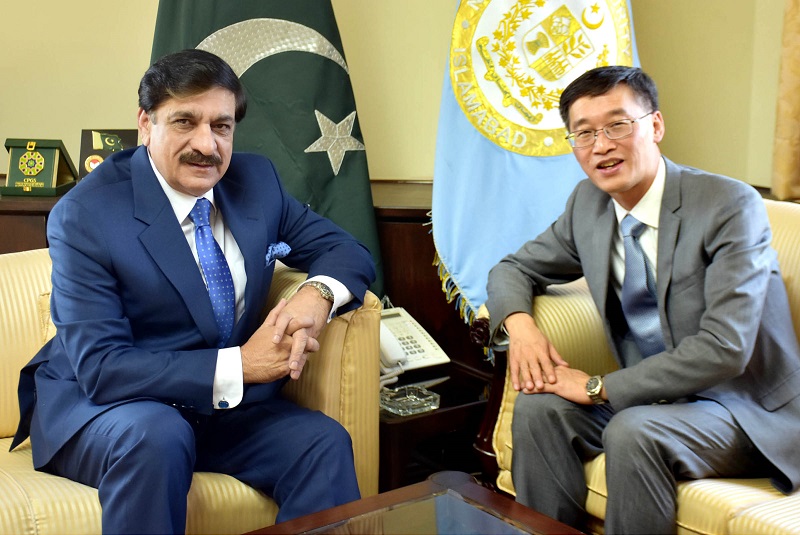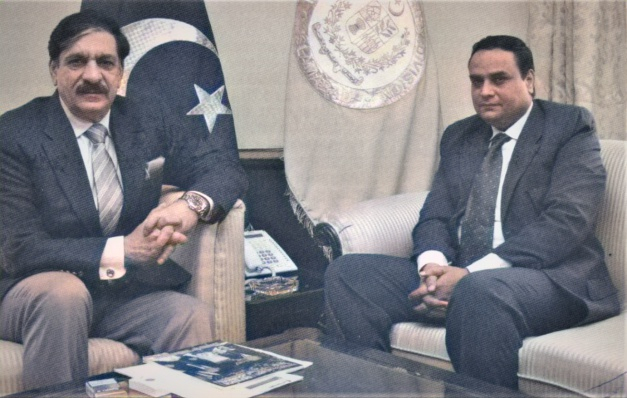General ® Nasser Khan Janjua, the Advisor to the Prime Minister on National Security has great knowledge about the security apparatus, war theater, human psychology, anti-terrorism tactics, regional power politics and National Security Policy (NSP) which he translated in his action while Commander of the XII Corps in Quetta, Balochistan.
He introduced a new concept of martial power and successfully transformed Balochistan. He is master of intelligence based operations which he applied throughout his services in Balochistan to lessen collateral damages. During the interview he talked about different sensitive issues relating to National Security Policy not confined to Balochistan, deteriorating situation at LOCs, worsening relations with India, Afghanistan and USA. He also shared his insights about the war against terrorism, US‘ new Afghanistan policy, balance of regional power and CPEC.
General ® Nasser Khan Janjua termed Balochistan as the “jewel of Pakistan” and future of its “blue economy” which has been put on the main stream politics of the country. While speaking on Balochistan, he pinpointed many factors i.e. fractured politics, vested interests, economic isolation, perpetual obsession of naked power, proxy wars of regional powers and the last but not the least, international power politics that have contributed to its political alienation and socio-economic isolation.
General Janjua was of the opinion that power brokers internally and externally have misguided the general masses of Balochistan for so many years due to which there was complete political chaos, societal fragmentation, severe deterioration of law and order situation and economic malaise which aggravated movement of “disintegration” from the Center/ Pakistan. Elements of socio-economic marginalization, administrative vindictiveness and ethnic division played havoc in the hearts and minds of common people in the province, he further added.
General ® Nasser Khan Janjua talked about the strategic importance of Balochistan because of its ideal location and utility. It has now become a hub of inter-regional connectivity and one of the easiest “logistic support Route” to Central Asian Countries. He further elaborated that China through the Pakistan Economic Corridor (CPEC) being a “game changer” mega project has also transformed Balochistan as “survival of blue economy”, “alternative maritime strategic installations” having capacity of “unlocking” the lock of so many “double landlocked countries” of the CIS.
General Janjua shared his opinion that the attaining the road to peace and harmony was not an easy task in Balochistan. Incidents of deadly attacks on armed forces, frontier constabulary, rangers and other para-military personnel were a routine matter. Heinous terrorist attacks on innocent civilians and installations remained a constant security threat to the provincial as well as central government. He remembered the sacrifices of Armed Forces of Pakistan, paramilitary and law enforcement agencies in the war of terror with so many precious lives being lost in the war against terrorism. Collateral damages were at its peak which also produced multiplier socio-economic, geopolitical and geo-strategic effects.
During his stay in Balochistan as Commander of the XII Corps in Quetta Lt. General ® Nasser Khan Janjua played a remarkable role in stabilizing the province by curbing terrorism and controlling its widespread sanctuaries. He maintained excellent functional working relationships with then Chief Minister Dr. Abdul Malik Baloch in stabilising the Balochistan.
General ® Nasser Khan Janjua remained instrumental in fighting against insurgency by initiating intelligence based counter-insurgency and counter-terrorism operations against a variety of militant groups. He successfully marginalized vicious killings and networking of sectarian militias and Indian-sponsored separatist groups. He worked tirelessly to bring peace and harmony to the province.
After achieving sustained stability, peace and harmony he institutionalized different policies to win the “hearts and minds” of the common people of Balochistan. Being a strategist he initiated different policies of “permanent dialogue” with different stakeholders of Balochistan, introducing innovative ways and means to change the pervious national narrative of using power in the province. Humanism, humanity, self-respect, dignity and above all immense social development were his key factors in the holistic approach throughout the province.
The General had also strictly instructed people in uniform to ensure minimum use of power which went a long way in spreading love, kindness, oneness and togetherness among the different ranks of the society. Messages of people’s welfare, education for everyone, better health, protection of life, and respect of people were disseminated in suitable manner which diluted to a great extent reigning sentiments of separation, isolation, armed struggle and hatred towards the system.
Under his supervision a number of primary schools were opened with pens being distributed. Before his arrival in the province the armed struggle had reached into the breadth and width of Balochistan, it expanded from rural mountainous regions to the city centers. He announced certain policy packages to convince the people involved in armed struggle to surrender, this achieved miraculous success. A series of economic packages were also sanctioned by the federal government and implemented by the provincial government which changed the negative perception of the people about governance and the system and succeeded in bringing back the province’s alienated population into the mainstream.
The province stands dangerously polarised and the electoral process was under threat by insurgent groups and separatist but the successful holding of local bodies elections accelerated process of decentralization and problems of the common people were solved at their doorsteps. Financial autonomy was granted which reduced many miseries of the common people. General Janjua also said that the common people were encouraged to join the Pakistan Army by opening many cadet schools and colleges. This established feel-good feeling among the youth and further enhanced levels of trust between the system and the people at large. The General pursued massive social mobilization towards achieving nationalism by starting different meaningful and interactive activities like debates, musical shows, rallies, walks, cricket matches, sports fairs, and community development programs. The dangerous sub-nationalism was replaced with successful model of pure and simple nationalism which curbed the spirits of alienation and isolation.

He also initiated different Confidence Building Measures (CBMs) by using verbal and nonverbal communication channels which resorted people’s confidence in the political system, national unity, and societal integration. Self-respect was secured which lessened resistance among the people of the province. Economic recession was outplayed by socio-economic prosperity by building many projects of small and medium enterprises (SMEs), people’s empowerment, availability of free loans and above all giving people a sense of ownership.
Discrimination against people was replaced with official transparency and determination to reduce ratios of poverty, unemployment and unsafety. Disintegration of political course was transformed with national integration. A fractured society was enabled to come out of frustration. A system that was rigged and corrupted was made free of corruption because of so many people and business friendly policies and reforms.
It was a gigantic effort on part of Nasser Khan Janjua, (NSA) in the province which changed its outlook. Lessening of social evils/ills was not easy to manage, but his “holistic approach” of massive socio-economic development had succeeded it. The bridging of political differences was not a simple task but his “greater/ grand political dialogue” proved to be decisive in this matter. Drastic reduction of poverty was once unthinkable but his superior knowledge of “human economy” turned the tables. Provision of new jobs was not achievable once, but his clear command on the development of localized economies paved the way of economic self-reliance and massive people empowerment in the province.
Lowering the sentiments of prejudice, bigotry, hatred and above all isolation was a marathon effort, all this was achieved by spreading economic prosperity, CBMs, and harmony among the different stakeholders and people alike.
General ® Nasser Khan Janjua was of the view that after announcement of CPEC, Balochistan has now become the hub of regional connectivity. Rigorous development of Gwadar Seaport has further enhanced its strategic importance. He emphasized that now, it is the high time to secure dividends of well-maintained socio-economic prosperity, political integration, societal harmony and people‘s trust by further allocations of funds for development and securing sense of ownership among the people by pursuing a “participatory approach” because Balochistan and Pakistan are one and the same.





